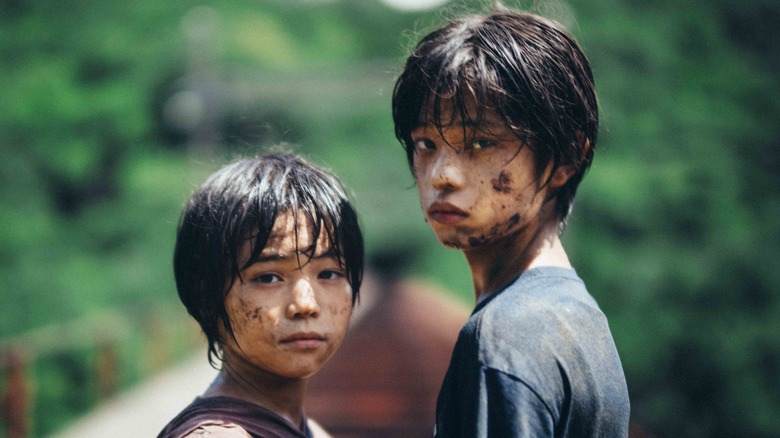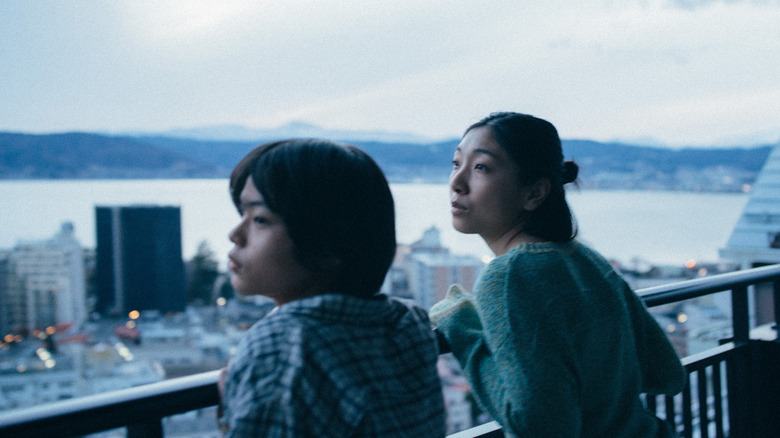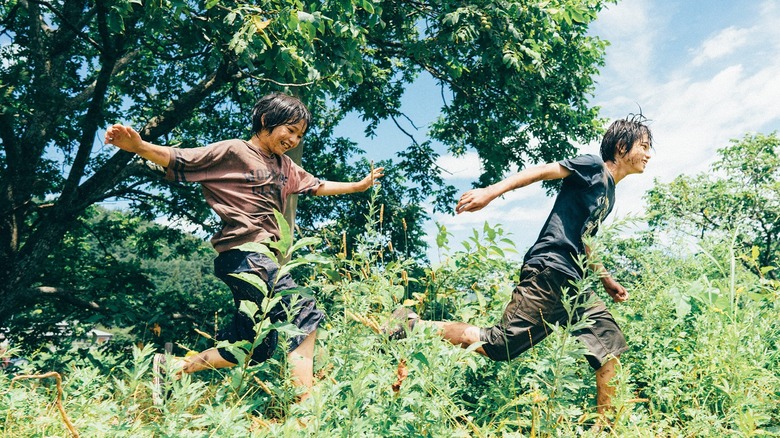Monster Review: A Shocking, Deeply Human Japanese Thriller
- The mystery continually challenges your assumptions
- Extremely tense, yet also beautiful
- Great acting all around
- The second act is slightly less gripping than the first and third
"Monster," the latest film from director Hirokazu Kore-eda premiering at the 2023 Cannes Film Festival, is not a horror movie, but it's not just the title that seems to edge into that territory. Kore-eda's first film made in his native Japan since 2018's Palme D'or winner "Shoplifters" and his first he didn't write himself since his debut narrative "Maborosi" (Yuji Sakamoto is the screenwriter here) is built around visceral, violent images: a building on fire, a brutal storm, bloody injuries on children. It's certainly easy for the trailer to present this material as horror.
The soundtrack also adds to these vibes. It's comprised of pieces by the late great Ryuichi Sakamoto, including two written specifically for this film that were the composer's final compositions before his death. The music used as the main theme of "Monster" is one titled "20220207," from Sakamoto's final album "12." It's obviously quoting the Latin hymn "Dies irae" — which is maybe best recognized today through Wendy Carlos' and Rachel Elkind's remix for the opening of "The Shining."
To pitch the first act of "Monster" from a horror movie lens, imagine if the protagonist of "The Babadook" was trying a lot harder to be a good mother. Both "Monster" and "The Babadook" are about single moms raising boys who are clearly traumatized by the deaths of their fathers, seemingly neurodivergent in ways that get them in trouble, and potentially being driven in darker directions. Where Amelia (Essie Davis) in "The Babadook" lashed out terrifyingly at her child, however, Saori (Sakura Ando) goes hard in defending her child Minato (Soya Kurokawa) from a world that seems to be out to get him. But does she truly understand what is happening to him?
The latest revamp of Rashomon
Towards the beginning of the film, Minato asks his mom if someone with a pig's brain implanted into a human body would still be considered human. He initially says he's just interested in the science, but when pressed, he eventually explains that his fifth-grade teacher Hori (Eita Nagayama) called him a pig-brained monster. Saori has noticed her son has been acting depressed; he repeatedly asks questions about death and reincarnation, and in one upsetting scene, he flings himself from a moving car as an act of self-injury. Hearing that an abusive teacher is the primary source of her son's pain sends Saori on a righteous war path to get justice against the school.
The teachers, including the school principal Fushimi (Yuko Tanaka), engage in a series of big overly formal apologies to try to make everything right. Saori isn't satisfied, further questioning the situation and engaging in some semi-invasive detective work of her own. Hori comes off as deeply unlikable throughout all of this, with even his smile inspiring disgust. He claims that Minato is not some innocent victim but has in fact been bullying his even more eccentric classmate Eri (Hinata Hiraagi) — claims neither Saori nor the viewer wants to believe, even as her investigation uncovers hints that this very well may be the case.
Just as the tension of all this drama reaches a crescendo, the story restarts. This time around, we see everything from Hori's perspective, complicating our assumptions about the narrative built up in the first act. The third act once again goes back to the beginning, presenting our fullest picture of the truth primarily from Minato's own perspective, though with some scenes told more through the eyes of Eri and even Fushimi.
The obvious point of comparison is "Rashomon," the 1950 Akira Kurosawa film that brought Japanese cinema to global attention. Both movies retell the same story from different characters' perspectives, each telling leading to different conclusions. The divergences of perspective in "Rashomon," however, are based on every character having reason to lie about the central murder. While there are lies told in "Monster," the overall effect is closer to the allegory of blind men describing an elephant by touching different parts of its body. From the knowledge she's been given, Saori has every reason to believe that her understanding of Minato's story is true, as does Hori. But honest belief is not the same as truth.
The third act is a tearjerker
The third act of "Monster" is hard to discuss without spoilers. Some reviews have just flat-out given major twists away, so be careful what you read about this film. Instead of plot specifics, I'll attempt to describe the experience: if the first act is an intense heightened thriller, and the second act maintains that intrigue and anxiety (if slowing down a bit), then act three finally gives us a sense of joy and relief — which of course gives way to the sadness we know is coming, but this time it plays more in the vein of Hirokazu Kore-eda's past sensitive dramas.
Kore-eda continues to be one of the best directors around when it comes to coaxing amazing performances out of child actors. Sakura Ando, who previously stole the show in "Shoplifters," is so expectedly compelling that for a time you might worry the film will lose steam once she leaves the focus, but Eita Nagayama and Hinata Hiiragi are such naturals at a young age that their drama proves to be the most impacting of all. You'll want to protect these kids, and knowing that things will go wrong for them is heartbreaking.
This is a film that will resonate deeply with those who felt like outsiders growing up, and with anyone who was ever bullied over things they couldn't control. There's a direct comparison to be made with a recent Oscar nominee I won't name for the sake of spoiler avoidance, but I think this movie handles that material even better (and certainly less manipulatively). Perhaps the highest praise I can give "Monster": even with all of its emotional pain, I absolutely want to watch it a second time to see how having the full perspective shifts the experience.
"Monster" premiered at the 2023 Cannes Film Festival and opens in Japanese theaters on June 2. International release plans have yet to be announced.


